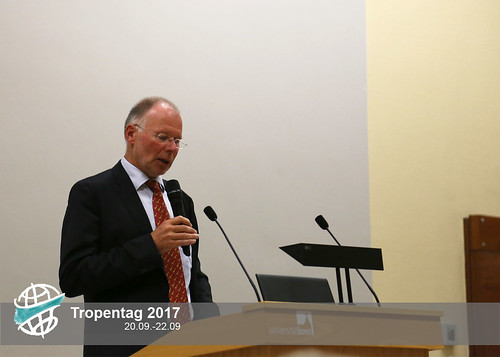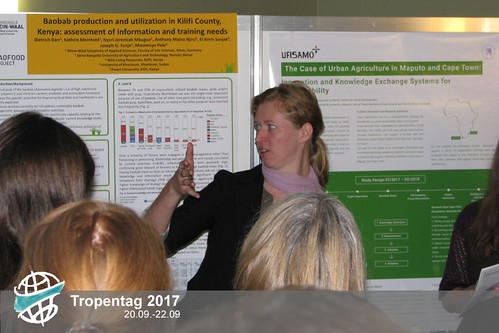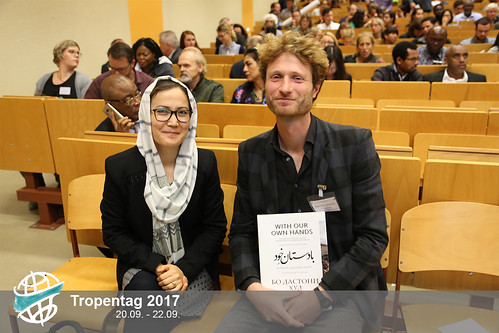Tropentag 2017

“Smallscale Organic Agriculture is a Niche”
Mon, 10/02/2017 - 16:17 — marlemke“Small-scale organic agriculture is a niche” said Hans-Joachim Preuß, the managing director of GIZ, the largest development aid agency in Germany. Apparently, the future of development is large-scale industrial agriculture and big investment, according to the agenda of GIZ. “Smallscale organic agriculture won’t save the world”, said Hans Braun, director of the CGIAR Research Program on Wheat at CIMMYT, a research and training institution focused on wheat and maize. I wondered, what happened to sustainable agriculture?

The excitement and expectations of the participants of Tropentag about this year’s theme “Future Agriculture: Social-ecological transitions and bio-cultural shifts” didn't flag and were mostly met throughout the week, at least until the last two keynote speakers. Braun suggested further intensification of grain cultivation, as well as greater collaboration with the GIZ. Braun’s statements were reinforced by Preuß, who said organic products were to “only" address a “niche market”.
Vétérinaires Sans Frontières (Germany)
Wed, 09/27/2017 - 12:00 — TTVétérinaires Sans Frontières is an NGO that operates in East Africa. They support pastoral communities through various projects, such as training animal health workers, who travel through local communities helping to both detect common diseases, and vaccinate against them. Another example is improving food hygiene, by providing aluminum cans to store milk. For more, go to their website
The Green Talents Award
Mon, 09/25/2017 - 18:33 — TTThe German Federal Ministry of Education and Research (BMBF) hosts the prestigious ”Green Talents – International Forum for High Potentials in Sustainable Development” to promote the international exchange of innovative green ideas. The winners come from numerous countries and scientific disciplines and are recognised for their outstanding achievements in making our societies more sustainable.
According to project coordinator Julia Kirschner, winning the Green Talents Award means you are invited with the other 24 recipients to Germany to attend the Green Talents Science Forum. You do not only get a chance to travel around Germany, but the chance to visit three experts of your choice. A year later you can arrange to have a research stay for three months at the institution of your choice.
A recipient of the award in 2016, Hèou Maléki Badjana from Togo shares his thoughts and experiences in the video below.
If you are interested in the Green Talents Competition 2018 please register for their Competition Alert and you will be informed as soon as the next submission period starts.
.First Day Poster Sessions
Mon, 09/25/2017 - 17:22 — TTA guided tour through some of the poster presentations on the first day of Tropentag 2017.

Give Farmers their Agency Back!
Mon, 09/25/2017 - 00:12 — marlemkeThe answer is: centralized breeding. Unfortunately, farmers are left out of the selection, development, and maintenance of crop traits. Even if they are the producers of our local food, and should be the protagonist.
The poster session on “Knowledge Systems” focused on educational and operative strategies with the ultimate goal of bringing food sovereignty to indigenous communities. Participatory breeding is an example of one that could strengthen local communities and provide independence from big seed and fertilizer companies.
Wouldn't that be great? This would not only give small farmers more freedom, but would also banish GMOs from their plates. Two birds with one stone.

A Changing Environment Changing Lives
Sun, 09/24/2017 - 13:06 — giulia.rotanodariIn many countries, migration is a growing phenomenon because of political, economic and environmental reasons. In the last few decades, sudden or long-term changes in the environment are further exacerbating the often already precarious conditions in Sub-Saharan Africa, shaping the livelihoods of subsistence farmers in particular. This is shown by a study conducted in Ethiopia by Juliane Groth, from the Helmholtz Centre for Environmental Research (UFZ) during the "Institutions and Livelihood" oral presentation session .
By analyzing the reasons that force rural people to migrate, Groth found that this phenomenon is strongly linked to land degradation and shifts in rainfall seasonality. These are the drivers of the decline in livestock quantity and agricultural production. As a result, farmers are looking for fast growing crop varieties that allow for cultivation in a shortened rainy season.
Groth's study is evidence of the need for global intervention with programs to mitigate the impacts of climate change, especially by working with farmers to develop and introduce faster growing crops.
It's All About the Genes
Sun, 09/24/2017 - 12:23 — kristianj71I’m preaching to the choir, but to repeat for the nth time, climate change promises greater weather unpredictability and extreme temperatures worldwide. One strategy to mitigate the impact lies in mining genetic resources, gene banks and land races, for useful plant characteristics.
Farmers for thousands of years have carefully selected plants best fit to withstand the harsh environments found on their fields. This led to breathtaking genetic variety, as each field has its own unique microclimate. The resulting land races, often ignored due to their lower productivity, are an unexploited resource that could yield tomorrow’s answers. Dr. Mathias Wissuwa of JIRCAS in his oral presentation in “Genetic Resources and Abiotic Stresses” emphasized the need to tap the hidden genetic potential in land races and gene bank accessions.
Advances in genome sequencing technologies have lowered costs to a point where thousands of gene bank accessions can be mapped to find rare alleles that could enhance nutrient capture, or increased tolerance to drought. Once identified, market assisted selection (MAS) can be used to improve the crop. IRRI used this method to first identify the SUB1 gene, which gives flood tolerance, and then breed it into commonly grown varieties, creating ‘scuba’ rice. Dr. Wissuwa and JIRCAS has made promising headway in identifying a gene that promotes crown root growth to increase nutrient capture efficiency of zinc and phosphorous. At the end of his presentation, he went to great lengths to stress MAS had nothing to do with GMOs.
Moving Pictures
Fri, 09/22/2017 - 13:04 — schumacherlydiaInstead of presenting another powerpoint, Frederik van Oudenhoven impressed the audience with his moving pictures - a movie about the villages of the Pamir Mountains in Afghanistan and Tajikistan. This vivid movie not only touched me, but the majority of the audience, measured by the loud and lasting applause afterwards.

The Dutch film maker and biologist has devoted the last few years to understanding, preserving and publishing the traditional knowledge of people living in the isolated villages around the Afghan-Tajikistan border. Instead of focusing on the numbers of unemployed, undernourished and illiterate, he turned the camera to not only stunning landscapes but agricultural production, food processing, food culture and the people behind each stage. Further, he emphasized the beauty of diversity, whether it was biodiversity or cultural diversity. His film suggest with the loss of diversity we also lose beauty.




